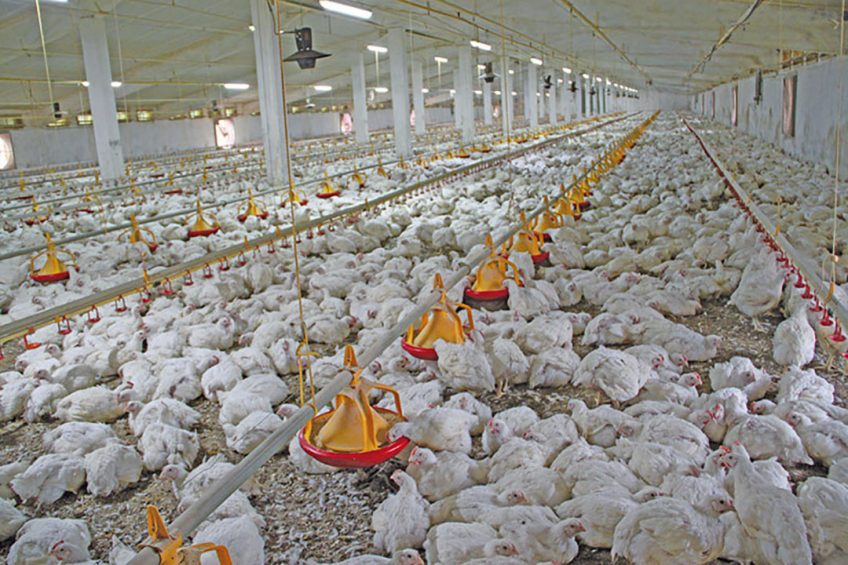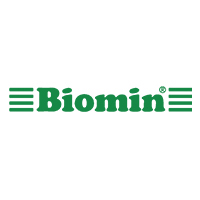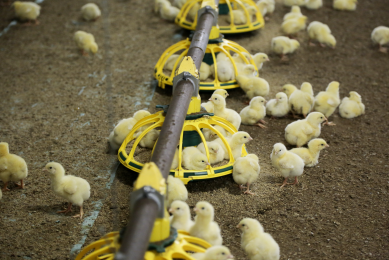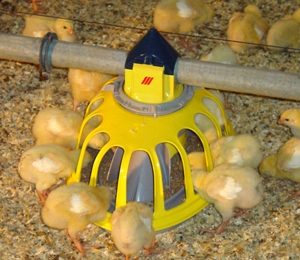Improving broiler performance on top of an AGP regimen in India

The results of an Indian broiler trial demonstrates that a well-defined, poultry-specific, multi-species synbiotic improves performance.
The main objective in poultry production is to achieve high quality products at high levels of productivity. The key for producers to achieve this goal is to avoid bacterial challenges e.g. from feed, water, environment, gastrointestinal tract and to mitigate mycotoxins. Doing so without the use of antibiotic growth promoters (AGPs) requires different strategies that focus on prevention and promote good gut performance.
AGP exit
Traditionally, AGPs have been supplemented in poultry feed to improve performance and mitigate the negative effects of pathogens that colonise the gastrointestinal tract (GIT). Most of these pathogens are Gram-negative bacteria that have a lipopolysaccharide (LPS) or endotoxin layer. The release of LPS in an animal’s bloodstream can cause severe health problems in poultry and aggravate the effects of heat stress.
Concerns about potential development of antibiotic resistance due to excessive and unregulated use of AGPs have led to regulations banning their use in Europe and consumer pressure with the same objective in North America. The ban on AGPs in poultry diets has been accompanied by an increased incidence of certain diseases, raising interest on alternatives to be used in poultry production.
Beneficial bacteria for poultry
The use of probiotics can be an alternative way to increase the performance of production in poultry. Several microorganisms are currently used as probiotics in animal nutrition with remarked differences regarding their properties, origins and modes of action. They can be divided into 3 main groups:
- Lactic Acid Bacteria (LAB),
- Bacillus spore formers
- Yeasts.
Genera like Lactobacilli, Pediococci and Enterococci which belong to the group of LAB and Bifidobacteria, are currently very well-studied probiotics and considered drivers of gut health. LAB are part of the indigenous microflora that permanently colonise the intestinal tract whereas Bacilli and yeasts are considered as transient microflora.
How probiotics support gut health
Supplementation with the right probiotics favourably influences the microbial community in the gut, and aid the bird to establish or re-establish the state of eubiosis, thus enhancing gut health and productivity. In general, the following modes of action of probiotics are proposed:
- Competition with pathogenic bacteria for space, intestinal adhesion sites and nutrients (competitive exclusion)
- Enhancement of epithelial barrier integrity
- Production of antimicrobial substances
- Change of environmental conditions in the intestine by lowering pH through increased production of acids
- Enhancement of intestinal immune function
The main goal of probiotics is to influence the intestinal microflora in a positive way, either by promoting its development, maturation or stabilisation. A well-established intestinal microflora is crucial for the health of our animals, especially if we expect high production performance. It is extremely important to the best for their ability to fight off infections with enteric pathogens and for guaranteeing a well-functioning end effective digestion of nutrients, resulting in good growth performance parameters.
Competitive exclusion
The right probiotic bacterial strains block receptor sites in the intestinal wall, thus preventing pathogenic bacteria from establishing themselves in the gut. This principle is known as ‘competitive exclusion.’ These beneficial microbes produce lactic acid (and other metabolites, i.e. short chain fatty acids), that reduce the pH in the animal’s gut and make it less favourable for opportunistic/pathogenic bacteria to grow or proliferate.
Probiotic supplementation of the intestinal microflora will also enhance the gut barrier, primarily by preventing colonization by pathogens and by acting indirectly as adjuvant-like stimulation of innate and acquired immune functions. However, evidence for probiotic-mediated enhancement of immunity requires further research.
PoultryStar for better efficiency and performance
A study conducted at broiler farm, Hyderabad, India confirmed positive effects of combination of probiotic and prebiotic (PoultryStar, BIOMIN Holding GmbH, Austria) on live body weight, FCR and mortality. The trial was conducted using 9,770 Cobb day-old chicks, divided into 2 groups where the birds were housed in broiler sheds. Commercial crumbles chick feed was provided for the first 20 days, followed by commercial full mash broiler feed until the end of the trial. Colistin sulphate and doxycycline were used as AGPs in feed throughout the trial period in both groups. Feed and water were provided ad libitum.
Both trial groups had received the same water treatment:
- Water sanitiser throughout the trial period
- Water acidifier for the first 15 days of the trial with inclusion rate of 300 mL/1,000 birds
- Liver tonic with inclusion rate of 100 mL/1,000 birds at Day 6, 7 & 8
- Enroflaxacin with a dose of 100mL/1,000 birds at Day 28, 29 & 30
All the birds were vaccinated against Newcastle and Gumboro disease viruses.
Trial groups:
- Negative control group (NC): commercial feed, no feed additive.
- NC + PoultryStar sol (soluble): with inclusion rate of 2 g/1,000 birds/day via drinking water throughout the 40 days production cycle.
The birds were kept under observation for 40 days and the performance parameters; body weight gain, feed intake, feed conversion ratio (FCR) and mortality rate were measured and calculated. The study showed higher live body weight in the PoultryStar group by 80 grams, FCR was lower than the control group with (-0.08) difference and mortality rate was 0.27% than the control (Table 1).
Conclusion
The aim of this trial was to investigate the effects of PoultryStar on growth parameters of broiler chickens under Indian farming conditions, and how that can affect the farm performance. The results of the trial showed that PoultryStar is effective in improving broiler performance. Compared to the negative control, it increased the final live weight and broiler productivity index by 4.4% and 9.5%.
Authors: Luis Valenzuela, Product Manager and Dr. Gangga Widyanugraha, Regional Technical Sales Manager – Poultry




